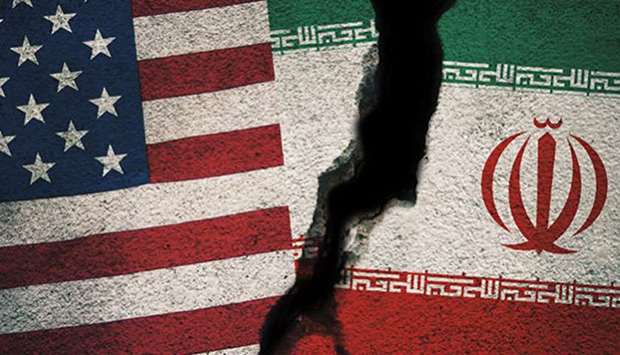*Tehran demands lifting of sanctions to facilitate new talks
*EU defies US move, takes steps to protect European firms
US President Donald Trump on Monday signed an executive order reimposing many sanctions on Iran, three months after pulling out of the Iranian nuclear deal, saying the US policy is to levy "maximum economic pressure" on the country.
US officials said that the first set of that US sanctions will come into effect at dawn Tuesday. Those sanctions target Iran's automotive sector as well as gold and other metals. A second batch of US sanctions targeting Iran's oil sector and central bank will be reimposed in early November.
The officials added that the US would not grant exemptions or exceptions but would consider any requests individually, noting that the goal of the US policy is not to change the regime in Iran but to change the behaviour of the Iranian government and reach a new nuclear agreement, Radio Sawa reported.
They said that the US president is ready to meet with Iranian officials at any time, noting that the US sanctions will continue to exert effective financial pressure on the Iranian economy, and that 100 international companies have already agreed to leave the Iranian market.
Earlier, US Secretary of State Mike Pompeo said that renewed US sanctions on Iran will be rigorously enforced and remain in place until the Iranian government radically changes course.
Iran has said in the past that if the sanctions were re-imposed it could also renege on its side of the nuclear deal, and resume enriching uranium.
Europe appears ready to defy the US move. "The European Union's updated Blocking Statute will enter into force on August 7 to protect EU companies doing legitimate business with Iran from the impact of US extra-territorial sanctions," read a joint statement by the foreign ministers of Britain, France and Germany and backed by the EU's foreign policy chief, Federica Mogherini.
"We are very hopeful that we can find a way to move forward, but it is going to require enormous change on the part of the Iranian regime," US Secretary of State Pompeo said on Sunday.
AFP quoted Iran's President Hassan Rouhani saying on Monday that Washington's call for new nuclear negotiations at the same time as it reimposes crippling sanctions "doesn't make sense" and is an attempt at "psychological warfare".
"If you're an enemy and you stab the other person with a knife and then you say you want negotiations, then the first thing you have to do is remove the knife," he said in an interview on state television.
It was his first response to Trump's offer of talks on a new deal to replace a 2015 pact he abandoned in May, and came as Iran braces for the return of sweeping US sanctions on Tuesday.
"They want to launch psychological warfare against the Iranian nation," Rouhani said. "Negotiations with sanctions does not make sense."
Trump's withdrawal from the historic multilateral accord in May infuriated his European partners.
The first round of sanctions takes effect on Tuesday at 7am Qatar time, targeting Iran's access to US banknotes and key industries including cars and carpets.
"The Iranian regime faces a choice," Trump said in a statement. "Either change its threatening, destabilising behaviour and reintegrate with the global economy, or continue down a path of economic isolation."
"I remain open to reaching a more comprehensive deal that addresses the full range of the regime's malign activities, including its ballistic missile programme and its support for terrorism," he added.
Iran's currency has lost around half its value since Trump announced the US would withdraw from the pact.
Rouhani's government has taken emergency measures to stem the collapse of the rial and brace for the return of sanctions.
On Sunday, it eased foreign exchange rules, allowing unlimited tax-free currency and gold imports, and reopening exchange bureaus after an attempt to fix the value of the rial in April led to widespread black-market corruption.
With senior religious authorities calling for a crackdown on graft, the judiciary said Sunday it had arrested the central bank's foreign exchange boss, along with a government clerk and four currency brokers.
The measures appeared to calm the markets on Monday, with the rial strengthening to 95,500 to the dollar -- up a fifth on its record-low of 119,000 a fortnight ago, according to AFP.

